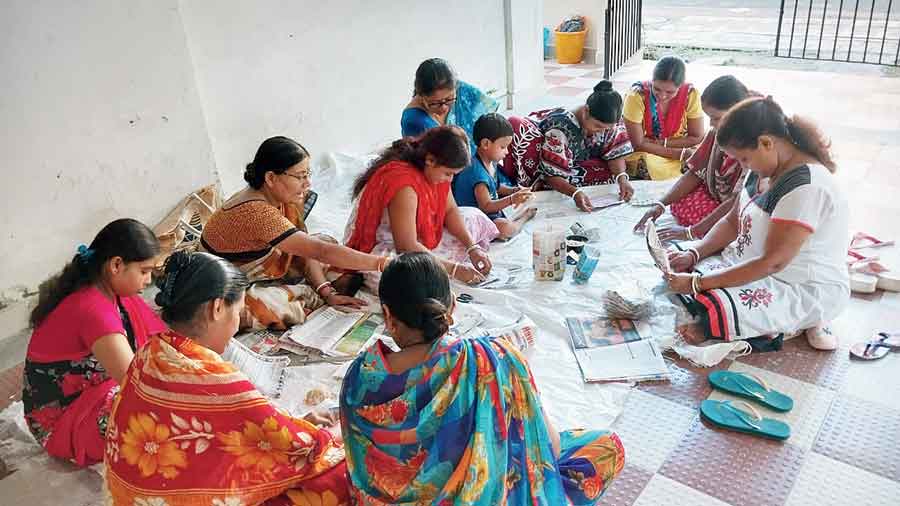A group of ladies in New Town has started teaching wives of caretakers in their block to make paper bags that they can sell in the market. In the bargain, they are empowering these women as well as promoting the message of going plastic-free.
Labanya-Bina, a social group started by CD Block’s Sithi Kana Ghatak, started this initiative in August. “Previously, I had wanted to conduct anti-plastic awareness camps on the block level but lacked support. Then when the government banned plastic bags of less than 75 microns, I thought of providing users with an alternative,” says Ghatak, who named the group after her mother and mother-in-law.
She sounded out word and CD Block neighbours gladly pitched in. Together they invited wives of building caretakers to come make these thongas. “A resident Sanjit Adhikari arranged space for us under his co-operative building and we meet there once a week for a couple of hours to make the bags,” Ghatak says.
Residents like Archana Bala, Sankari Mukharjee and Pampa Saha have been joining Ghatak in teaching the craft to the caretakers. “I grew up in a village in Bagnan where thonga-making is common so I know how to do it,” says Saha. “It's not tough but the women need more experience before they can estimate how much paper needs to cut to make thongas of various sizes, for instance. It's feels satisfying to be transferring my knowledge to someone in need.”
No one is happier than the 10-odd women learning the craft. Namita Mondal, who also works as a cook, has been eagerly coming for the afternoon workshops. “My husband is a driver and we have a son in Class IX. Every penny we earn will be useful for this future so I'm grateful for this opportunity. It's not that tough either,” she says.
Jaba Das lives under a co-operative building in the block as caretaker. “I have been on the lookout for a job but it's difficult to land one since I cannot leave my four-year-old home alone. But when I go for thonga-making, my child can tag along. Besides, the financial independence is helping me carve out my own identity. Why should I have to ask my husband for money all the time?” she reasons.
At present the women are collectively making more than 100 thongas a day but the rejection rate is high and about 50 to 60 of them are passing quality checks set by the volunteers. They are making bags to hold weight of between 100g and 1kg. The first shop to buy the thongas is Happy Mart grocery store in CB Market.
“I usually buy thongas from wholesale suppliers but I am buying them for these women to help them out. Their quality if fine and I have requested more bags of 250g and 500g,” said proprietor Anuj Agarwal. “I have been paying them slightly less than the market price but if their quality and quantity are up to the mark I could rethink the rates.”
Other shops are being spoken to and they have asked for bags made of tougher brown paper. “The women need more training before we attempt those,” says Ghatak, who is taking one step at a time.
Since the scale of operations is modest at present, the raw materials are being chipped in by volunteers. “We are getting scissors and old newspapers from our homes and making glue with wheat and hot water,” says Saha. “But we have approached NKDA for financial help so we can scale up.”
Mukharjee is eager to teach the women to stitch cloth bags and make jewellery too. “And not just the women. Four to five children have been coming with the mothers to the workshops who we could teach art, rhymes or help with schoolwork. My own children have grown up and I have time at hand for such noble causes.”
